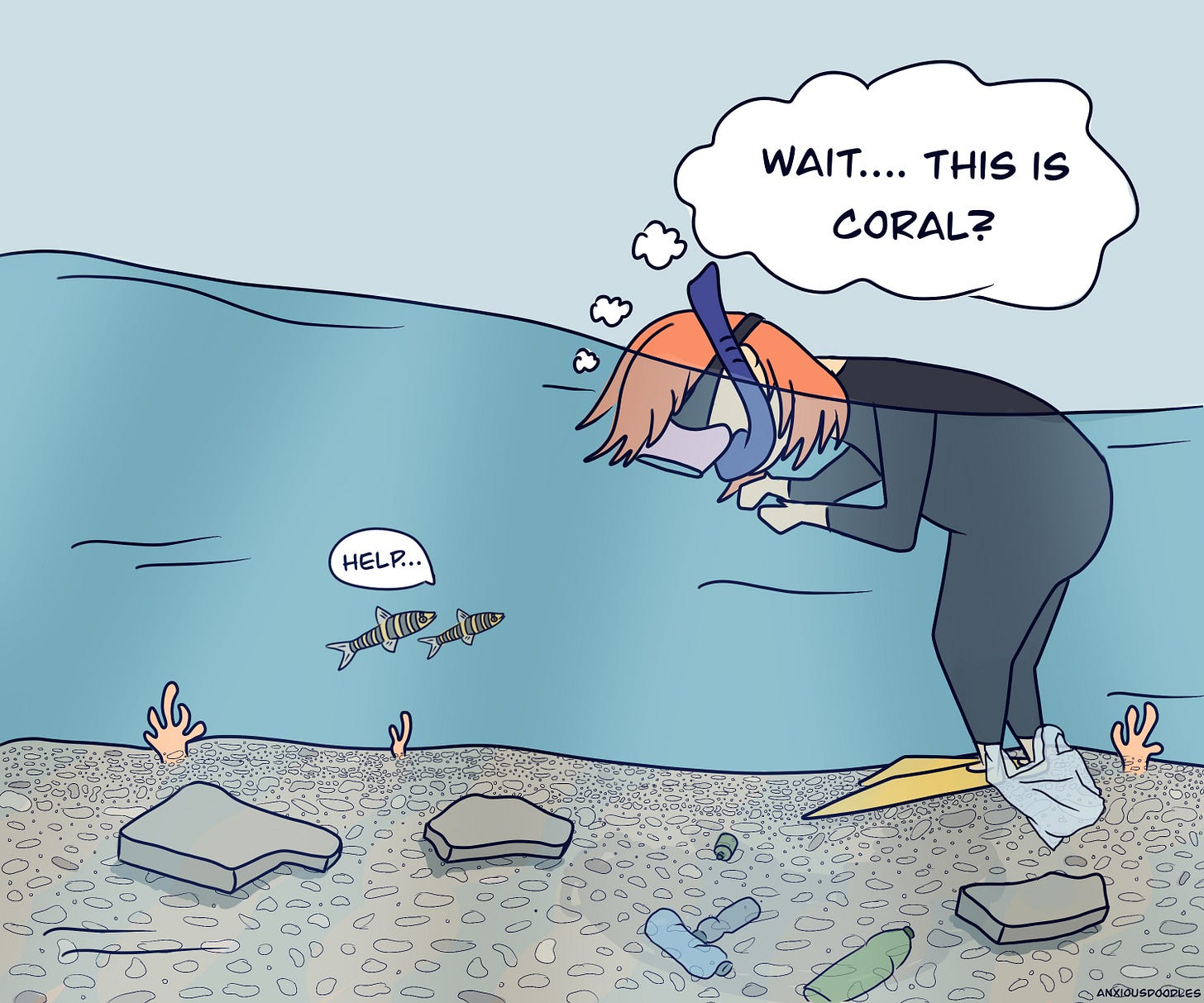What is being done to save coral reefs, before 2050?
Coral Reefs are sensitive organisms who are greatly affected by changing temperatures and chemical imbalances in their waters which makes them an endangered ecosystem.
“Limiting the global average temperature to well below 2°C above pre-industrial levels in line with the Paris Agreement provides the only chance for the survival of coral reefs globally.” Stated the IUCN in a 2021 Coral Reefs and Climate Change report.
My first thoughts – Well that’s just great, isn’t it? Considering much of the news that trickles into my digital bubble is telling me 2°C is a target that’s getting further and further out of reach – although not impossible to obtain. (2)
But this article isn’t designed to leave you in despair. In fact, I’m mixing it up this week and I want to introduce you to some of the incredible ongoing initiatives that are working to keep these vital, longstanding ecosystems alive.
First, I think it’s important to remind you what a coral reef is, and why it matters to life above water, and ultimately your life.
“Coral reef ecosystems are intricate and diverse collections of species that interact with each other and the physical environment. Coral is a class of animal that is related to hydroids, jellyfish, and sea anemones.” (3) explains the USA’s Environmental Protection Agency.
They later go on to state that “An estimated 25 percent of all marine life, including over 4,000 species of fish, are dependent on coral reefs at some point in their life cycle.”
But why should you care about corals? The California Academy of Sciences explains that “Half a billion people rely on coral reefs for food and income. But reefs provide more than food. They also provide protection. Healthy reefs protect land from the damaging effects of tropical storms, shielding the shoreline from waves” (4)
Additionally, an article featured in STEM Magazine explain that reefs also sustain the global economy through tourism and fishing, generating significant income and providing jobs for millions. Also, coral reefs are a source of life-saving medicines, with compounds derived from reef organisms used to treat cardiovascular diseases, cancer, and other illnesses. (5)
A way to summarise all this is that losing our coral reefs would be devastating on multiple levels. Levels that could in fact reach all the way up to how you and your family provide for yourselves.
That’s why these initiatives below are so damn important and need our awareness and attention more than ever, since the fossil fuel industry and leading politicians clearly aren’t feeling the pressure enough to say goodbye to their billion dollar bubbles.
Please do take a moment to look at these projects below, share their work and maybe even donate to support their cause (if you can).
coralreefrescueinitiative.org – working to safeguard globally-significant coral reefs and the benefits they provide against climate change and other threats.
coralrestoration.org – actively restoring coral reefs on a massive scale, educating others on the importance of our oceans, and using science to further coral research and coral reef monitoring techniques.
icriforum.org – A global partnership for the preservation of the world’s coral reefs and associated ecosystems.
kaust.edu.sa – a large-scale coral reef restoration program in the Red Sea that is being sustainably developed from the ground up with advanced technologies to redefine how people live, work, and play.
aims.gov.au – novel national research to influence both the size of future adult fish populations and the amount of coral cover on a reef.
50reefs.org – they produced the first-ever research of its kind. The scientific study, “Risk-sensitive planning for conserving coral reefs under rapid climate change” was published in June 2018 in Conservation Letters.
1 – https://www.iucn.org/resources/issues-brief/coral-reefs-and-climate-change
2 – https://www.carbonbrief.org/state-of-the-climate-2024-off-to-a-record-warm-start/
2 – https://www.theguardian.com/environment/2024/jan/08/global-temperature-over-1-5-c-climate-change
2 – https://foreignpolicy.com/2024/01/08/climate-target-degrees-warming-cop-emissions-resilience/
3 – https://www.epa.gov/coral-reefs/basic-information-about-coral-reefs
4 – https://www.calacademy.org/educators/how-do-humans-depend-on-coral-reefs
5 – https://bbnchasm.com/2022/03/09/coral-reefs-help-human-life-from-underwater/




